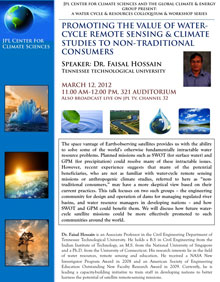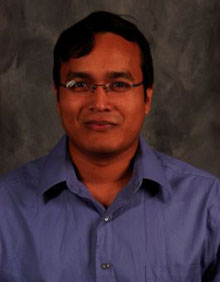Seminars
Promoting the Value of Water-Cycle Remote Sensing and Climate Studies to Non-Traditional Consumers
Dr. Faisal Hossain, Tennessee Tech University
March 12, 2012 | Jet Propulsion Laboratory, 11.00 am-12.00 pm, 321 Auditorium
About this Lecture

The space vantage of Earth-observing satellites provides us with the ability to solve some of the world’s otherwise fundamentally intractable water resource problems. Planned missions such as SWOT (for surface water) and GPM (for precipitation) could resolve many of these intractable issues. However, recent experience suggests that many of the potential beneficiaries, who are not as familiar with water-cycle remote sensing missions or anthropogenic climate studies, referred to here as “non-traditional consumers,” may have a more skeptical view based on their current practices. This talk focuses on two such groups – the engineering community for design and operation of dams for managing regulated river basins, and water resource managers in developing nations – and how SWOT and GPM could benefit them. We will discuss how future water-cycle satellite missions could be more effectively promoted to such communities around the world.
About Dr. Faisal Hossain

Dr. Faisal Hossain is an Associate Professor in the Civil Engineering Department of Tennessee Technological University. He holds a B.S in Civil Engineering from the Indian Institute of Technology, an M.S. from the National University of Singapore and a Ph.D. from the University of Connecticut. His research interests lie in the field of water resources, remote sensing and education. He received a NASA New Investigator Program Award in 2008 and an American Society of Engineering Education Outstanding New Faculty Research Award in 2009. Currently, he is leading a capacity-building initiative to train staff in developing nations to better harness the potential of satellite remote-sensing missions.
